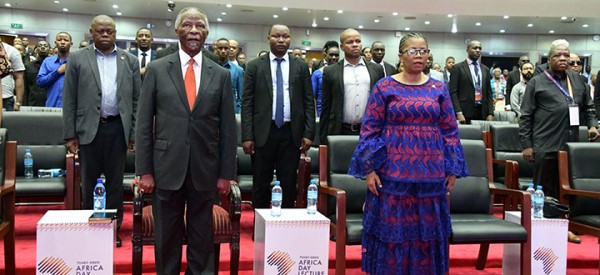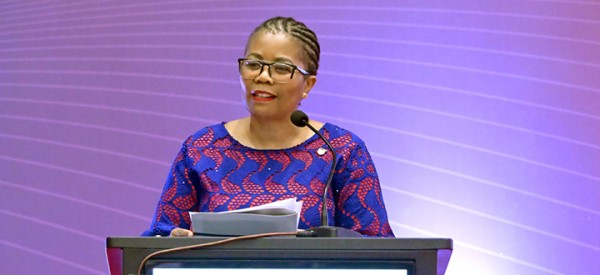News & Media
Thabo Mbeki Africa Day Lecture reflects on the state of the continent
On 24 May 2025, Unisa, in partnership with the Thabo Mbeki Foundation (TMF), the Government of Tanzania, and the Mwalimu Nyerere Foundation, hosted the 15th annual Thabo Mbeki Africa Day Lecture in Dar es Salaam, Tanzania. Themed The state of the continent, reigniting Africa’s renaissance, this flagship event focused on a series of events and topics endemic to Africa post-colonisation, such as the rule of law in Africa, complexities around national and international trade, Africa’s unemployed and underemployed youthful population, curriculum misalignment with the job market, and the feasibility of achieving the targets set by both the African Union Agenda 2063 and the United Nations Sustainable Development Goals.

Dr Thabo Mbeki, Unisa Chancellor, former South African President, and patron of the Thabo Mbeki Foundation, with Professor Puleng LenkaBula, Unisa Principal and Vice-Chancellor, and other delegates during the start of the Africa Day Lecture
“Africans must decide Africa’s destiny”
In his welcome address, His Excellency, Ambassador Ami Mpungwe, Advisory Council Member of the Thabo Mbeki Foundation, said that the gathering serves a testament to the collective determination of the gatherers who envision reigniting and accelerating the African renaissance – a vision which, he said, lies at the very core of the Thabo Mbeki Foundation.
Mpungwe said that the gathering aims to support progressive change, foster dialogue, and action and cultivate a new kind of African thought leader committed to Africa’s political, cultural, academic, and technological revival.
Mpungwe emphasised that by convening diverse stakeholders, celebrating African achievements, facilitating robust dialogues, and recognising outstanding contributions, this event and other flagship events hosted under the auspices of Dr Thabo Mbeki aim to strengthen African unity and foster greater global collaboration.
Mpungwe announced the soon-to-be-launched Thabo Mbeki Presidential Centre, set to open in 2028. “This state-of-the-art facility, envisioned by Zanele Mbeki, will serve as a multidisciplinary hub, which will have archives, a museum, research and education facilities, cultural spaces, and centres dedicated to women-led development and public engagement,” he said.
Delving deeper into the agenda of the lecture, Mpungwe argued that Africa is rich, “not merely in natural resources, but in human potential, cultural heritage, and intellectual capacity. Africa possesses the policies, talent and resources to eradicate poverty and conflict, while securing sustainable development. Yet, more work still needs to be done for Africa to reclaim its narrative, economic independence, and prosperity, and reaffirm its rightful position in the global arena.” He added that Africa’s destiny must be decided by Africans themselves.
Concluding his message, Mpungwe mentioned the adoption of technology, including the use of artificial intelligence, to fast-track Africa’s development, adding: “At the Thabo Mbeki Foundation, we measure its success by how well it empowers and inspires others to achieve such initiatives. We therefore invite you to walk this road with us and lend your expertise, networks, resources, and, above all, your belief that the African renaissance is not a slogan but an attainable reality.”
Preventing iconic histories from being erased
Speaking next, Unisa Principal and Vice-Chancellor (VC), Professor Puleng LenkaBula, said this conference is a significant platform for Africa to reflect on the state and the continent's future.
Continuing, the VC said that for too long, Africa’s iconic histories of liberation, emancipation, and the search for dignity have been erased, and this journey is reigniting the memorialisation of this aspect. “These kinds of initiatives will significantly contribute to resetting and resourcing Africa’s intellectual futures,” she added.

Professor Puleng LenkaBula, Unisa Principal and Vice-Chancellor
The VC stressed that thousands of years ago, civilisations flourished in Africa, which suffered not at all by comparison with those of other continents. “In those centuries,” she continued, “Africans were politically free and economically independent. Their social patterns were their own and their cultures were truly indigenous, however, 62 years later, we can admit to defeating official colonialism and the establishment of the Organisation of African Unity, now called the African Union, as an organisation to achieve the strategic goals of uniting Africans, African renewal, and prosperity for all.”
“With the reformed African Union,” continued the VC, “we have better continental institutions, a common agenda in the form of Agenda 2063, the Presidential Infrastructure Champion Initiative, the African Continental Free Trade Area, and African peer review mechanisms. We have made significant strides at a foundational level to set Africa on a course to achieve unity, peace, and prosperity.”
In conclusion, the VC cautioned that many challenges and hurdles remain: “We need to unite and overcome the things that divide us. The political processes and institutions of Africa cannot be understood or articulated outside their unique historical context, including the legacies of colonisation and the ongoing influence of global dynamics.”
Speaking next, Mzee Joseph Butiku, Chairperson, Mwalimu Nyerere Foundation, briefly detailed the idea behind the formation of the Nyerere Foundation, stating that it aims to preach and achieve unity and people-centred development in the world, especially in Africa. “This is what Nyerere wanted this foundation to do,” he said, “and indeed what it has been doing in the 27 years of its existence. “
The right people to action policies
Taking to the podium, Unisa Chancellor and former South African President, Dr Thabo Mbeki, said he was supposed to retire as president of the country in 2009. Still, he did so a year earlier, citing the divisions and political interferences that brought him to this decision. However, he said he continued, under the advice of other African heads of state, to focus on Africa's challenges.
He continued: “Africa has numerous good policies, yet there is a big deficiency – there are very few people who can implement them. Therefore, my advice was to prepare the human capital and the resources to implement decisions taken by the African Union.”
After taking this advice to heart, Mbeki said he established the Thabo Mbeki Foundation, which, he emphasised, is not a South African but an African foundation. Thereafter, he established an African leadership school, which, he said, “develops the right cadres who will be knowledgeable and focus on Africa’s policies and act on them. The best place to situate the school was at Unisa.”
“Furthermore,” said Mbeki, “at the foundation, we discussed what we will focus on in the Africa Day Lecture, and decided that to mark Africa Day, we should discuss Africa, where we are, and what should be done. Today is the 15th time we have done so.”

Panel discussants, from left: Prof Palamagamba Kabudi, Jenerali Ulimwengu, and Prof Issa Shivji
The next session of the lecture, themed looking back and moving forward, comprised a panel discussion which featured Professor Palamagamba Kabudi, Jenerali Ulimwengu, and Professor Issa Shivji. The discussants focused on a series of events and topics such as the state of the rule of law in Africa, complexities around national and international trade, Africa’s unemployed and underemployed youthful population, curriculum misalignment with the job market, and the feasibility of achieving the targets set by the African Union Agenda 2063 and the United Nations’ Sustainable Development Goals.
It was indeed symbolic that the 15th Thabo Mbeki Africa Day Lecture was hosted in Tanzania. This country played a pivotal role by supporting and providing a safe haven for South African exiled liberation stalwarts, who were fighting against the government of apartheid.
While both countries share deep ties with anti-colonial and Pan African bonds, this event sought to strengthen their ties through discussing and finding solutions to the issues facing Africa post-colonialism.
* By Godfrey Madibane, Acting Journalist, Department of Institutional Advancement
** Photography by Shooheima Champion, Multimedia Centre
Publish date: 2025/05/27

 Unisa co-hosts G20 community outreach in the Eastern Cape
Unisa co-hosts G20 community outreach in the Eastern Cape
 Unisans gain membership of prestigious science academies
Unisans gain membership of prestigious science academies
 Advocating for disability transformation through servant leadership
Advocating for disability transformation through servant leadership
 Unisa Press continues to illuminate the publishing space
Unisa Press continues to illuminate the publishing space